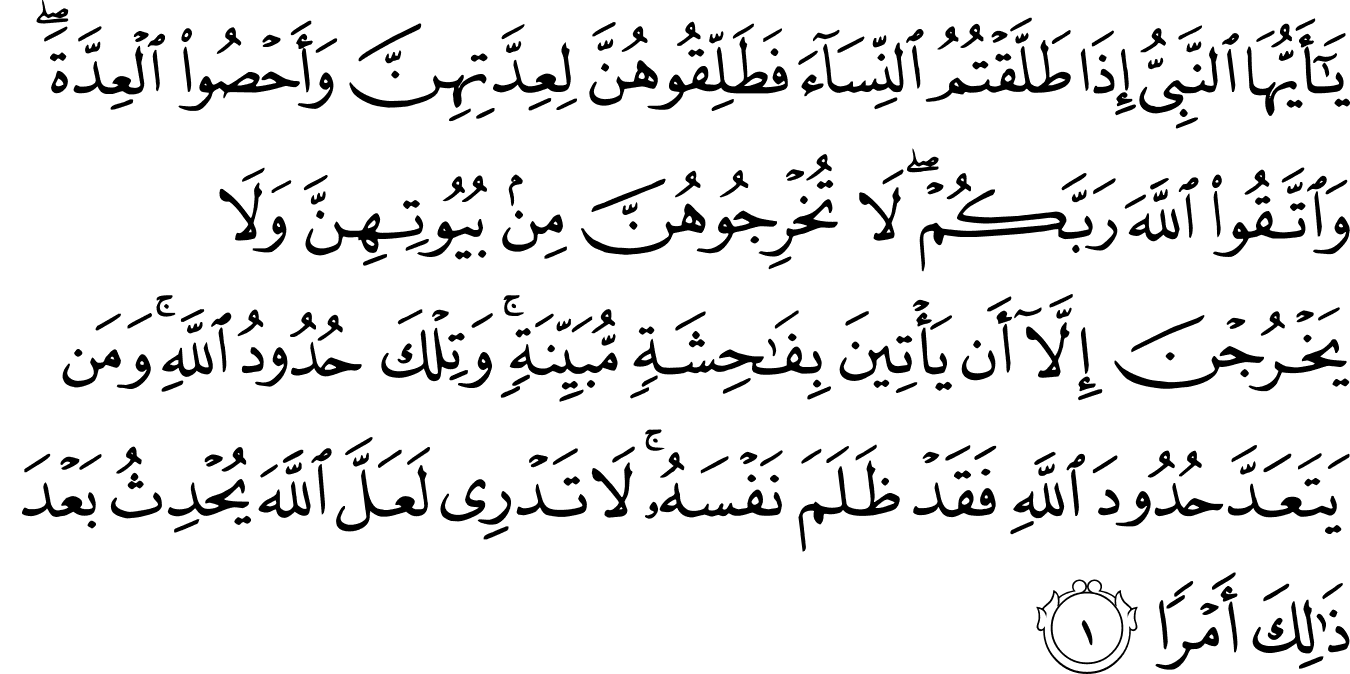#Islam
Marital Harmony And Conflict Resolution: The Quranic Paradigm
Published

Islam is a religion that provides a complete system of living for humankind, including marital harmony and conflict resolution. Islam is not a symbolic religion that limits itself to governing the demands of ritual worship and acts of devotion specific to a restricted time and place. Being the main source of law and guidance of that comprehensive system, the Qur’an seeks to provide a complete framework that covers personal, communal, social, family, and judicial operation. By presenting this Quranic paradigm, Allah
One particularly striking topic related to the holistic discourse of the Qur’an is the discussion in relation to marriage and family. In the Islamic worldview, the system of marriage and family is strongly promoted and is seen as the backbone for a moral society. This is apparent from various verses and prophetic traditions.
In this article, I aim to analyze the treatment of the topic of marital harmony and conflict resolution within the Quran and Quranic paradigm. This topic is of paramount relevance considering the current global reality of marital discord, even in Muslim populations. In the 1990’s, Dr Ilyas Ba-Yunus (professor of sociology at the state university of New York) conducted research that concluded that the divorce rate amongst American Muslims was a staggering 31 percent.2Ilyas Ba-Yunus, Divorce Amongst Muslims (Islamic Horizons Magazine, July/August 2000). Considering the huge number of divorces occurring as a result of marital discord, it is of utmost importance for us to analyze the Qur’anic presentation on this topic, in order to gain an insight into how the scripture aims to help solve such issues and mitigate the harms that can possibly result from high divorce rates.
Keep supporting MuslimMatters for the sake of Allah
Alhamdulillah, we're at over 850 supporters. Help us get to 900 supporters this month. All it takes is a small gift from a reader like you to keep us going, for just $2 / month.
The Prophet (SAW) has taught us the best of deeds are those that done consistently, even if they are small. Click here to support MuslimMatters with a monthly donation of $2 per month. Set it and collect blessings from Allah (swt) for the khayr you're supporting without thinking about it.
I aim to do this by first surveying the general Qur’anic principles of marriage, exploring the models the Qur’an puts in place in the case of marital problems, and then exploring Qur’anic passages that deal specifically with the different stages of this model.
Qur’anic Principles of Marriage & Marital Harmony
Upon analyzing the Qur’an, we find that it dedicates most of its verses dealing with marriage to promoting principles of marital harmony and conflict resolution, in opposition to just blanket directives commanding people to marry. This is indicative of the fact that the Qur’an is not just promoting unregulated marriage, but rather the maintenance of sustainable and blissful marriages that will form a key part of the fabric of a utopian moral society. There are two particularly striking verses in this regard. The first is verse 187 of Sūrah al-Baqarah [2], where Allah
The second verse is found in Sūrah al-Rūm [30], where Allah
“Another of His signs is that He created spouses from among yourselves for you to live with in tranquillity: He ordained love and kindness between you. There truly are signs in this for those who reflect.” [Surah Ar-Rum: 30;21]5Qur’an 30:21.
This verse informs us of the key purpose of the institution of marriage: “to live with [each other] in tranquillity.” In order to achieve this tranquillity, Allah

However, when a person puts the consciousness of Allah

When Things go Wrong: Conflict Resolution
Whilst the Qur’an provides the recipe for marital harmony and bliss, it still recognizes that -for a plethora of reasons- not all marriages will operate perfectly upon the ideal model, and that conflicts will inevitably occur amongst many spouses. Thus, the Qur’an also provides detailed directives regarding conflict resolution, in order to mitigate the harms of such conflict and solve it through amicable resolution before the marriage degenerates further. Furthermore, the Qur’an recognizes that sometimes when conflicts just cannot be resolved spouses may have to resort to divorce (ṭalāq); so the Qur’an provides directives that ensure divorces are handled in the most just and amicable manner so that none of the involved parties are oppressed during the process. In fact, a whole chapter of the Qur’an is named Sūrah al-Ṭalāq (Chapter of Divorce).6See Qur’an 65:1 Additionally, there is also mention of the concept of khulʿ – a process where a women can initiate divorce proceedings and attempt to have the marriage dissolved upon a settlement.7See Qur’an 2:229. The Qur’an also recognizes issues of child custody and liability after a failed marriage, as when children are involved they are often the most negatively affected.8See Qur’an 65:6-7 and 2:233. The presence of all these above-mentioned discussions in the Qur’an demonstrates a well-constructed and holistic marital model. Below, we shall continue by analyzing passages from the Qur’an that detail these steps of conflict resolution as well as the last resort of separation.
Guidance on Conflict Resolution from the Quranic Paradigm
Allah

“Live with them in accordance with what is fair and kind: if you dislike them, it may well be that you dislike something in which Allah has put much good.” [Sūrah al-Nisā’:4;19]9Qur’an 4:19.
This verse is part of a collective of verses in the Chapter of the Women (Sūrah al-Nisā’) that enjoin good treatment of women. The first part of this particular verse provides a directive to live with them (ʿāshirūhunna) with maʿrūf. The verb ʿāshara – yuʿāshiru in the mufāʿalah form is taken from the word al-ʿishrah, which means ‘to associate’. Some linguists state that the word is actually derived from al-ʿashīrah (nearest kinsfolk), indicating that a husband should make his wife feel as though she is amongst the closest kin to him by treating her in the best way.10Ibn ʿĀshūr, Al-Taḥrīr wa ’l-Tanwīr (Tunisia: Dār al-Tūnisiyyah li ’l-Nashr, 1984), 4:286. As for the definition of the word maʿrūf, the exegetes say that it refers to as much gentle speech and treatment as is humanely possible in the spirit of the Shariah, just as a man would expect to be treated by his wife.11Ibn Kathīr, Tafsīr al-Qur’an al-ʿAẓīm (Beirut: Dār al-Kutub al-ʿIlmiyyah, 1998), 2:212. Other exegetes add generosity in spousal endowments (nafaqah) and housing (mabīt).12Jalāl al-Dīn al-Suyūṭī and al-Maḥallī, Tafsīr al-Jalālayn (Cairo: Dār al-Ḥadīth, 2001), 102. Some commentators also add that this treatment with maʿrūf is according to her family standards and proper societal norms (ʿurf),13Linguistically, the word maʿrūf comes from the same root letters as ʿurf (societal norms). and not in the singular opinion of the husband –a point that indicates the importance of assessing compatibility (kafā’ah) between prospective spouses in order to avoid issues later on.14See al-Shawkānī, Fatḥ al-Qadīr (Beirut: Dār Ibn Kathīr, 1994), 1:507. This order is followed by the indication that this good treatment should be upheld even in the case of disliking a certain quality in the spouse, for if people were to exhibit poor behavior upon not liking a certain quality in a spouse, then most marriages would be destined to fail. This is as no human being is perfect, and people are naturally of different temperaments.
Thus, this part of the verse strongly promotes tolerance and compromise between the spouses, and concludes by adding that the same quality that you dislike may actually become a source of good for you by virtue of your exercising patience and tolerance. Exegetes explain that in the heat of the moment, a person may not understand at first glance how any good could come of such a situation. However, a person should take the time to ponder and think deeply about this, all the while acknowledging that sometimes the knowledge of true good is a wisdom belonging to Allah
In a separate verse of Sūrah al-Nisā’, Allah

“Men are the caretakers of women,16This translation of the first part of the verse has been taken from The Clear Qur’an by Dr Mustafa Khattab, as this seems closer to the original Arabic. Abdel Haleem translates it as, “Husbands should take good care of their wives.” with [the bounties] Allah has given to some more than others and with what they spend out of their own money. Righteous wives are devout and guard what Allah would have them guard in their husbands’ absence. If you fear high-handedness [nushūz] from your wives, remind them [of the teachings of God], then ignore them when you go to bed, then hit them. If they obey you, you have no right to act against them: Allah is most high and great.”[Sūrah al-Nisā’: 4;34]17Qur’an 4:34.
This verse begins by stating that men are qawwāmūn of women – meaning they are their protectors, caretakers, and maintainers who are responsible for both their care and just rectification if required.18Ibn Kathīr, Tafsīr al-Qur’an al-ʿAẓīm, 2:256. The verse then states that this is with ‘the bounties Allah has given to some more than others’ – acknowledging the better financial situation and corresponding responsibilities Allah

The next part details the course of action a husband should take in his role as qawwām (intensive form of qā’im, pl. qawwāmūn) if he experiences nushūz (high-handedness or ill-conduct) from his wife, which conflicts with the description of a righteous wife. He is given step-by-step instructions; first, he is to advise her with good words hoping this advice will be sufficient to rectify her. If this does not bear fruit, he is to cease conjugal relations with her, or abandon sleeping and conversing with her in her bedding, or avoid speaking with her in the usual manner20The exegetes have provided these different explanations of wa uhjurūhunna fī ’l-maḍājiʿ. – hoping this advisory action may push her to reflect and realize her behavioral error. The final resort is then to hit (iḍribūhunna). This may seem drastic on face value; however, it is imperative to explore the context and explanation of this advice in order to fully comprehend the issue at hand. Based on numerous prophetic traditions encouraging the good treatment of women and expounding on this issue, the earliest commentators stated that this final resort ‘hit’ was to be light enough not to leave a mark (ghayr mubarraḥ), should be done with nothing bigger than a tooth-stick, and should not be on the face.21Ibid. 258
Furthermore, the biographical works have no mention of the Prophet
Whilst in the previously mentioned verse Allah


“If a wife fears high-handedness or alienation from her husband, neither of them will be blamed if they come to a peaceful settlement, for peace is best. Although human souls are prone to selfishness, if you do good and are mindful of God, He is well aware of all that you do.” [Sūrah al-Nisā’:4;12]22Qur’an 4:128.
This verse states that the solution to such a situation is to attempt to agree to a peaceful settlement, as settlement is better than continued disagreement, aversion, arrogance, and hasty divorce.
Commentators mention that this settlement could be fair reconciliation brought about by arbitration, or may be the giving up some financial or personal marital rights in order to preserve the marriage relationship – though this verse was revealed in the context of Mother of the Believers Sawdah bint Zamʿah




Therefore, when attempting to bring about a resolution to a marital issue after exhausting all other steps, the Qur’an strongly advises that arbitration takes place with the counsel of wise people from the families of both sides as this will be conducive to amicable and fair reconciliation being achieved: 
“If you [believers] fear that a couple may break up, appoint one arbiter from his family and one from hers. Then, if the couple want to put things right, Allah will bring about a reconciliation between them: He is all knowing, all aware.”[Sūrah al-Nisā’:4;35]24Qur’an 4:35.
The Last Resort
When all the above-mentioned steps have been exhausted and reconciliation could not be achieved, thus making the marriage impossible to maintain whilst upholding the aims and principles of marriage from an Islamic perspective, the Qur’an provides an exit route from such a situation. This is the institution of divorce (ṭalāq). Considering that divorces are often a time when oppression is rife, the Qur’an provides detailed guidelines on how an amicable divorce should take place. In the opening verse of the Chapter of Divorce (Sūrah al-Ṭalāq), Allah
“Prophet, when any of you intend to divorce women, do so at a time when their prescribed waiting period can properly start, and calculate the period carefully: be mindful of God, your Lord. Do not drive them out of their homes––nor should they themselves leave––unless they commit a flagrant indecency. These are the limits set by Allah – whoever oversteps God’s limits wrongs his own soul – for you cannot know what new situation Allah may perhaps bring about. When they have completed their appointed term, either keep them honorably, or part with them honorably. Call two just witnesses from your people and establish witness for the sake of God.” [Sūrah al-Ṭalāq: 65;1]25Qur’an 65:1.
Further on in the chapter, Allah
“House the wives you are divorcing according to your means, wherever you house yourselves, and do not harass them so as to make their lives difficult. If they are pregnant, maintain them until they are delivered of their burdens; if they suckle your infants, pay them for it. Consult together in a good way- if you make difficulties for one another, another woman may suckle the child for the father.”[Sūrah al-Ṭalāq: 65;7]26Qur’an 65:7.
The instructions found in the above verses clearly aim to encourage responsibility and consideration when undertaking divorce, particularly regarding affairs of the household and children.
Furthermore, the Qur’an recognizes that in some cases an ideal separation will be out of reach for the wife, due to the husband’s refusal to allow an irrevocable divorce which he has no right to repeal except with his ex-wife’s agreement upon a new marriage agreement (ṭalāq bā’in baynūnah sughrā), or his refusal to issue three divorces that together constitute the highest degree of irrevocable divorce that forbids the couple from remarrying except after the woman has legitimately married and divorced another man (ṭalāq bā’in baynūnah kubrā/mughallaẓah). For this particularly difficult scenario, the Qur’an also provides a solution: 
“Divorce can happen twice, and [each time] wives either be kept on in an acceptable manner or released in a good way. It is not lawful for you to take back anything that you have given [your wives], except where both fear that they cannot maintain [the marriage] within the bounds set by God: if you [arbiters] suspect that the couple may not be able to do this, then there will be no blame on either of them if the woman opts to give something for her release. These are the bounds set by God: do not overstep them. It is those who overstep God’s bounds who are doing wrong.” [Surat Al-Baqarah: 2;229]27Qur’an 2:229.
This verse mentions the ruling of khulʿ – the process where a women can initiate divorce proceedings and attempt to have the marriage dissolved upon a financial settlement such as the return of her wedding dowry (mahr).28Aḥmad al-Jaṣṣās, Aḥkām al-Qur’ān (Beirut: Dār al-Kutub al-ʿIlmiyyah, 1994), 1:475. In the case that the husband still refuses to allow a divorce, the Islamic legal system allows a women to seek marriage annulment (faskh al-nikāḥ), which is a binding dissolution of an Islamic marriage pronounced by a Shariah court or council after reviewing the application of the wife upon valid legal grounds.29Wahbah al-Zuḥaylī, Al-Fiqh al-Islāmī wa Adillatuh (Damascus: Dār al-Fikr, fourth revised edition), 4:3094, 4:3150. These grounds include the husband’s failure to fulfill marital obligations; the husband’s failure to provide maintenance despite capacity to do so; cruelty to the wife; serious discord between the parties; and marriage by deception, amongst other reasons that will be evaluated on a case-by-case basis by the adjudicating body. This provides a much-needed last resort for an abused woman, and ensures that she does not remain locked in a relationship that is damaging for her well-being.
Conclusion: Marital Harmony and Conflict Resolution in the Quran
Based on the above analysis of the Qur’anic paradigm on marriage and conflict resolution, we can conclude that the Qur’an presents a holistic model that seeks to uphold the vital social institution of marriage whilst ensuring that individual human dignity and health is put at the forefront of this system. The guidance on key principles of a blissful marriage, various suggestions regarding conflict resolution, and detailed exit system are clear evidence of this.
Related reading:
– The Joy Of Our Eyes: The Nature Of Marriage In Islam
– Podcast: Sex, Marriage, and Mutual Obligations in Islam | Ustadh Mukhtar Ba
Podcast: Sex, Marriage, and Mutual Obligations in Islam | Ustadh Mukhtar Ba
Keep supporting MuslimMatters for the sake of Allah
Alhamdulillah, we're at over 850 supporters. Help us get to 900 supporters this month. All it takes is a small gift from a reader like you to keep us going, for just $2 / month.
The Prophet (SAW) has taught us the best of deeds are those that done consistently, even if they are small. Click here to support MuslimMatters with a monthly donation of $2 per month. Set it and collect blessings from Allah (swt) for the khayr you're supporting without thinking about it.
Shaykh Muhammad Ziyad graduated from a traditional Islamic seminary (Darul Uloom Leicester) with licenses in Qur'an memorisation, the Seven Qur’anic Readings, ʿĀlimiyyah (Islamic scholarship), and other related fields. He further undertook the MA Degree in Islamic Studies at SOAS University of London where he focused on the study of the Qur'an. Having a keen interest in education, he supplemented his Islamic studies by completing a Diploma in Education and Training and achieving Qualified Teacher Status. He is currently based in London where he teaches Qur'an and Islamic Studies at a secondary school, as well as lecturing on Hadith at a seminary for females. He is also an Islamic literature editor, volunteer imam, and appears on various Muslim TV channels.


[Podcast] Ramadan Is Not For Your Private Spirituality | Dr Farah El-Sharif

Iranian Leader Khamenei Slain As War Brings Mayhem To The Gulf

Week 2 Recap: Has Your Teen’s Approach to Relationships Changed? | Night 14 with the Qur’an

NICOTINE – A Ramadan Story [Part 2] : Cold Turkey

When It’s Hard to Forgive: What Parents Need to Know About Islamic Forgiveness | Night 13 with the Qur’an

30 Nights with the Qur’an: A Ramadan Series for Muslim Teens

[Podcast] Guardians of the Tradition: Muslim Women & Islamic Education | Anse Tamara Gray

Where Does Your Dollar Go? – How We Can Avoid Another Beydoun Controversy

Who Am I Really? What Surat Al-‘Asr Teaches Muslim Teens About Identity | Night 1 with the Qur’an

An Unending Grief: Uyghurs And Ramadan Under Chinese Occupation

I Can’t Stop Thinking About Someone | Night 10 with the Qur’an

When to Walk Away from Toxic Friends | Night 9 with the Qur’an

What Islam Actually Says About NonMuslim Friends | Night 8 with the Qur’an

Week 1 in Review: Is Your Teen Actually Changing? | Night 7 with the Qur’an

Why Your Teen Wants to Change Their Muslim Name | Night 6 with the Qur’an
Trending
-
#Islam2 weeks ago
30 Nights with the Qur’an: A Ramadan Series for Muslim Teens
-
#Life1 month ago
[Podcast] The Parts of Being an Imam They Don’t Warn You About | Sh Mohammad Elshinawy
-
#Islam1 month ago
How to Make this Ramadan Epic | Shaykh Muhammad Alshareef
-
#Islam4 weeks ago
[Podcast] Guardians of the Tradition: Muslim Women & Islamic Education | Anse Tamara Gray












Truth
August 20, 2022 at 1:59 PM
There are many marriages which have been destroyed due to the despicable behaviour of dominating fathers-in-law and controlling mothers-in-law. In joint families, daughters-in-law are still treated like housemaids. In-laws continuously interfere in their children’s marriages and sometimes it becomes unbearable and marriages which were otherwise perfectly fine end in divorce. Men also suffer due to their parents’ atrocious behaviour. In-laws need to understand that they have no Islamic right over their daughter-in-law. I’m surprised that there is not a single article addressing this issue.
Abdullah
August 20, 2022 at 8:06 PM
Well, here’s comment one:
OMG.
Reading some of these comments…if they’re for real…
We’re in trouble.
Big trouble.
And we’re not ready for much off anything.
Abdullah
August 20, 2022 at 9:29 PM
Comment #2.
The article is excellent. Jezekum Allahu khairun.
I would like to suggest that some practical details be developed in the future. For example, it behooves one to become acquainted with the characteristics of the more damaging personality disorders, such as borderline and narcissistic disorders, not to mention sociopathy. Even an individual with only some of the traits of one or more of these can be enormously damaging to a marriage and/or family. Further, one should be aware that the opportunities for significant change in such an individual is VERY poor. And there are many ostensibly religious Muslims with such traits. The consensus of the experts is that the only realistic course for the spouse of an individual with strong traits of these disorders is to get out. One could go on and on, but suffice it to say that these issues should be considered early and often in the event of marital discord and, even better, when considering marriage in the first place.
If terms such as covert or vulnerable narcissism (a particularly difficult type in large part because it is less obvious), pseudomutuality, enmeshed family, framing the story, gaslighting, flying monkeys, and so on are unfamiliar, then many Muslims experiencing dysfunctional marriages or hoping to avoid a dysfunctional or toxic marriage would do well to study up.
Abdullah
August 20, 2022 at 9:31 PM
And regarding my first comment above, I see the comments I was referring to have been deleted. Thanks, Moderators.
MMReader
August 24, 2022 at 1:41 PM
MM admins delete comments that don’t align with their woke agenda. The result is an echo chamber. That’s nothing to be proud about.
Sammy
August 30, 2022 at 4:35 PM
Salam alaikum. This is a great article. Jazak Allah for sharing.
This article mostly discusses resolution of conflicts between the husband and wife. However, one of biggest sources of conflicts that I see in marriage, especially in Asian/Indo-Pak countries, is that from other family members (respective parents/in-laws and others).
When conflicts arise between the bride and her in-laws, guys especially are caught in the middle and are torn between so called “loyalty” to wife vs parents.
In many cases, I have seen parents expecting their male children to live in with them, while the wife wants to live apart.
I have heard of fatwas that have advocated guys to divorce women in the event of such conflicts, ‘cos parents are more important in the scheme of things.
Can you please provide any practical islamic guidance on how to deal with these types of conflicts? Jazak Allah
Truth
August 31, 2022 at 2:59 PM
Sammy, if a man if financially well off and is able to provide his wife a seperate apartment, it becomes compulsory for him to do so. Divorce is NOT allowed under such circumstances.
Husband
August 31, 2022 at 3:36 PM
Mr Sammy,
I have never heard of any scholar giving such a fatwa. Parents have no business interfering in their children’s marriages. According to Shariah, in-laws do not have any right over their daughter-in-law. A wife has no religious obligation to serve her husband’s parents. Conflicts arise when in-laws cross their boundaries. As a solution a man can either live seperately with his wife or if he is not in a position to do so, he must tell his parents clearly that Islam does not give them any right over their daughter-in-law. It is a man’s duty to protect his relationship with his wife.
Mr. Fantastic
September 3, 2022 at 4:25 AM
Mothers and sisters poisoning the minds of married men against their wives is all too common in the subcontinent.